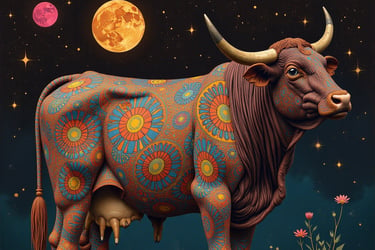Cosmic Cow
TheVedicSite(c)2024
The Sacredness of Life & Vegetarianism


The cow is a mother to mankind whom we should love,respect and protect. Her milk is the life blood for many species, including humans. Her dung provides fuel and bricks for millions of rural families across Asia . Her urine is medicine for the sick. When she dies her skin provides us warmth and protection through clothing.
In Astrology, the cow or bull is the symbol of the sign Taurus, a sign representing earth, nature and all its bounties. In Vedic Astrology, the cow's many wonderful qualities are emphasized through the various nakshatras. She is one of the universal mothers represented by the constellation Krittika. Her unlimited resourcefulness is associated with the constellation Rohini, whose symbol, 'an oxen cart pulling a fresh harvest' highlights the fertility aspect of both the earth and the cow. ‘Bhooma Devi’ or ‘Mother Earth’ is symbolised as a cow in the Vedic tradition, as just like the earth, the cow is an endless giver of resources and nourishment. The cow's nourishing aspect is associated with the constellation Pushya, which has a cow's ‘milk giving udder’ as its main symbol and is a constellation related to motherhood and dependability. The cow's patient and gentle nature is associated with the constellation Uttara bhadrapada,which has cow as its sexual animal.
In the Vedic pantheon of gods, the bull or cow is the vehicle of Lord Siva, and a symbol of strength and endurance. Vishnu's avatar form of Krishna, took the incarnation of a cowherd who enchanted cows and other living beings with his flute playing. His association with cows highlighted the importance of protecting and respecting the earth and its creatures. In the Vedas, one can find the story of the divine cow Kamadhenu, "the wish fulfilling cow" who is the dear treasure of the seven celestial sages. She emerged from the churning of the celestial ocean, along with many other treasures including the divine nectar of immortality, amrita ". As she is greatly desired for her endless gifts and bounty she remains under the care and protection of the sages. In all ancient cultures cows have played an important role in helping man understand his duty and relationship to the natural environment.
It is a great tragedy that in today's world, cows and other highly sentient beings, are the undeserving victim of barbarous tortures and all manner of atrocities in the name of satisfying man's palate and greedy nature. It is a reflection of the current world cycle Kali Yuga (an age where ignorance and darkness reign), that the most gentlest and innocent of creatures are put through the worst treatment imagineable in the most mindless manner. This sort of ignorance breeds more ignorance and creates much negative karma for the individual and collective.
The darker forces controlling the planet have deliberately conditioned humans into believing that meat is an essential part of dietary survival, and by over breeding cows in large numbers, have succeeded in destroying much of the earth's fertile land in order to feed these genetically & hormonally tampered creatures; land which could otherwise be used to grow crops that increase the world’s food supply a thousand fold.
There is no good reason why humans should eat meat. The physical constitution of humans is much more similar to herbivore mammals than carnivores. Eating meat produces a whole range of detrimental effects. At the most basic level it harms our physical health, but much more complex and subtle damage happens on the mental, emotional and subtle planes. There is enough information and proof on the subject, if one takes the time to look.
With today's high tech global transatlantic communications, vegetarian food sources of every type are available to anyone just about anywhere on the planet. There is enough agricultural knowledge and technology to grow crops in areas that suffer from extreme climates or other hazardous conditions.
Humans have ability to access a basic level of compassion inside themselves, which they clearly express in regard to their household pets, but not to cows, pigs, sheep, chicken etc. who are equally sensitive and feel the same levels of pain and fear as the domestic dog or cat.
No great feats of heroism or sacrifice are required to contribute to the enlightenment of the planet. Just by making simple changes in our every day living routine like discriminating what / what not to eat, can have significant and far reaching impact on the future destiny and wellbeing of all.
Quotes from Scriptures
These scriptures unambiguously support the meatless way of life. In the Mahabharat, for instance, the great warrior Bheeshm explains to Yuddhishtira, eldest of the Paandav princes, that the meat of animals is like the flesh of one's own son. Similarly, the Manusmriti declares that one should `refrain from eating all kinds of meat,' for such eating involves killing and and leads to Karmic bondage (Bandh) [5.49]. Elsewhere in the Vedic literature, the last of the great Vedic kings, Maharaja Parikshit, is quoted as saying that `only the animal-killer cannot relish the message of the Absolute Truth [Shrimad Bhagvatam 10.1.4].
Scripture
He who desires to augment his own flesh by eating the flesh of other creatures lives in misery in whatever species he may take his birth. Mahabharat 115.47
Those high-souled persons who desire beauty, faultlessness of limbs, long life, understanding, mental and physical strength and memory should abstain from acts of injury. Mahabharat 18.115.8
The very name of cow is Aghnya ["not to be killed"], indicating that they should never be slaughtered. Who, then could slay them? Surely, one who kills a cow or abull commits a heinous crime. Mahabharat Shantiparv 262.47
The purchaser of flesh performs Hinsa (violence) by his wealth; he who eats flesh does so by enjoying its taste; the killer does Hinsa by actually tying and killing the animal. Thus, there are three forms of killing: he who brings flesh or sends for it, he who cuts off the limbs of an animal, and he who purchases, sells or cooks flesh and eats it -- all of these are to be considered meat-eaters. Mahabharat Anu 115.40
He who sees that the Lord of all is ever the same in all that is -- immortal in the field of mortality -- he sees the truth. And when a man sees that the God in himself is the same God in all that is, he hurts not himself by hurting others. Then he goes, indeed, to the highest path. Bhagavad Geeta 13.27-28
Ahinsa is the highest Dharm. Ahinsa is the best Tapas. Ahinsa is the greatest gift. Ahinsa is the highest self-control. Ahinsa is the highest sacrifice. Ahinsa is the highest power. Ahinsa is the highest friend. Ahinsa is the highest truth. Ahinsa is the highest teaching. Mahabharat 18.116.37-41
What is the good way? It is the path that reflects on how it may avoid killing any creature. Tirukural 324
All that lives will press palms together in prayerful adoration of those who refuse to slaughter and savor meat. Tirukural 260
What is virtuous conduct? It is never destroying life, for killing leads to every other sin. Tirukural 312, 321
Goodness is never one with the minds of these two: one who wields a weapon and one who feasts on a creature's flesh. Tirukural 253


